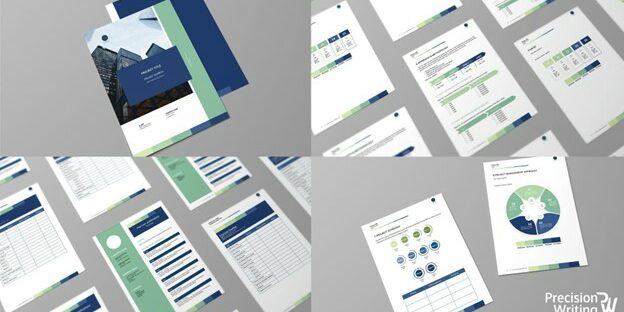Boosting Your Proposal Game: The Pros And Cons Of RFP Templates

by Alexandra Harrison | March 15, 2024

Intro
In the hustle and bustle of the engineering and construction industry, developing and refining RFP processes can often feel like an uphill battle. Professionals are continually seeking ways to streamline their workflow, make their proposals more compelling, and tackle the challenges that come with responding to Request for Proposals (RFPs). Enter the world of proposal templates, a seemingly perfect solution. However, like any tool, they come with their own set of pros and cons. Let’s dig into the world of RFP templates to help you decide if they could be the ace up your sleeve.
What is a Proposal Template and How Does it Work?
Imagine having a blueprint for your RFP responses; a roadmap to guide you through the various twists and turns of proposal writing. That’s what a proposal template essentially is. It’s a pre-established framework that aids in structuring your proposals, where each section is reserved for specific key details. You’ll find slots for your company’s profile, the methodology you plan to implement for the project, projected timelines, budget estimates, and past work references, among others.
This invaluable tool works by offering a starting line for each proposal you develop. All you have to do is fill in the relevant specifics for each new RFP you’re responding to. It’s like having a fill-in-the-blanks exercise that, when completed, transforms into a comprehensive, professional proposal.
A proposal template can be a real game-changer in the way it helps to standardize your proposals. It’s like putting on a sharp, well-tailored suit that impeccably presents your brand and services to potential clients. And the best part? You don’t have to build that suit from scratch every time. Now that’s a win for both efficiency and consistency!
The Benefits of Using Proposal Templates for RFP Responses
Consider the beauty of a proposal template as an RFP lifesaver, a kind of Swiss Army knife for construction professionals. It’s more than just a time-saver, though that alone is enough to make it a worthy contender in your proposal toolbelt. A template also promises precision, ensuring every critical piece of information is included. That’s a priceless perk, as missing details can send your proposal into the ‘rejected’ pile.
The template’s structure allows each part of your proposal to be meticulously organized. From your company’s profile to project plans and past work references, each crucial detail finds its home in the right section. It’s like a well-organized wardrobe where everything is hung neatly and ready for use, making it almost impossible to forget to wear your socks!
Adding another feather to its cap, the template allows for customization. Each RFP is unique, and each potential client has their own set of expectations. A template gives you the flexibility to cater to these varying needs, so your proposals are both comprehensive and perfectly tailored to the project at hand.
So, using a proposal template is akin to having a trusted partner by your side. It ensures you make a compelling case, meticulously addressing all the specifics, while keeping your brand consistent. Remember, a solid proposal not only convinces potential clients of your capabilities but also reflects the quality of your work. And with a template, you’re always putting your best foot forward.
Time Saving and Efficiency: The Cornerstones of Proposal Templates
Consider this scenario: You’re sitting at your desk, staring at a new RFP, and the clock is ticking. Each passing second brings you closer to the submission deadline. A sense of panic begins to creep in as you realize you have to craft a detailed, persuasive proposal from scratch – and time is not on your side. Now, imagine an alternative situation where you have a proposal template at your fingertips. Instead of a blank page, you start with an organized framework ready to be populated with relevant details. Suddenly, the daunting task seems much less intimidating, right? This is the magic of proposal templates!
By providing a clear structure, proposal templates eliminate the need to reinvent the wheel with each new RFP. Rather than sweating over how to structure your proposal, you can dedicate your time to fine-tuning the crucial details that make your company shine. It’s like having a head start in a race, giving you a valuable leg up over competitors who are scrambling to start from scratch.
The real beauty of proposal templates lies in their power to streamline your process. Their systematic structure paves the way for quick, efficient proposal writing, a boon in an industry where time is a precious commodity. And while your competitors are still wrestling with their first drafts, you’ll be polishing your final copy. That’s the kind of time-efficiency a proposal template can offer.
On top of that, the uniformity of templates leads to a smoother workflow. Having a pre-arranged layout for your proposals means you know exactly where each piece of information should go, further reducing the time spent on organizing and structuring your responses. It’s like having your ducks in a row, ready for the race.
So, when it comes to saving time and boosting efficiency, proposal templates really do hit the mark. They transform a potentially stressful task into a straightforward process, allowing you to focus on what truly matters – crafting a compelling proposal that secures the bid.
Standardization and Consistency: The Hidden Strength of Proposal Templates
There’s a quiet but formidable strength tucked away in proposal templates – the power of uniformity and reliability. Think of it as the steady drummer in a marching band, setting the rhythm for the rest of the troupe to follow. That’s what a proposal template does for your brand. It sets the tone, the look, the feel of your RFP responses, creating an unshakable consistency that permeates every proposal that leaves your desk. This harmony in your presentation not only speaks volumes about your professional acumen but also amplifies your brand’s recognition in the eyes of potential clients.
But, there’s more! This consistency makes life easier for your team as well. As your proposal process becomes standardized, it’s less likely for missteps and errors to sneak in. And when it’s time for the review process? It’s a breeze! The standard layout enables anyone on your team to quickly understand and review the proposal, leading to better collaboration and a more robust final product.
And let’s not forget your potential clients. Just like us, they too appreciate familiarity. A consistently structured proposal allows them to find the information they need swiftly and effortlessly. So, while a proposal template might seem like just a tool for efficiency, it’s really so much more. It’s a torchbearer of your brand’s identity, an advocate for team collaboration, and a guide for potential clients. A true hidden champion in the realm of RFP responses!
The Drawbacks of Using Proposal Templates for RFP Responses
While proposal templates can be a winning ally, they’re not without their fair share of challenges. One noteworthy hurdle is the trap of becoming overly formulaic. It’s easy to get comfortable in the organized layout and end up crafting a response that feels more like a mass-produced product than a bespoke creation. If your proposal starts to echo a cookie-cutter vibe, it could potentially lack the individualized attention that impresses potential clients.
Moreover, if your template isn’t well-constructed, it may lead to issues such as misplaced or omitted details, which can put a dent in your proposal’s quality. Remember, every RFP is a unique entity with specific requirements, and a template may not always capture all the intricacies needed for a comprehensive response. If the heart of your proposal beats with the same monotonous rhythm for every RFP, you might be missing out on the chance to tune into the unique song each new opportunity sings. So, while the template is a wonderful tool, it’s crucial to stay alert to these potential pitfalls in your journey to crafting winning proposals.
Avoiding the Pitfall of Generic Responses: A Word of Caution
While templates undeniably offer a solid starting point, there’s a word of caution to keep in mind. They should never restrict the individuality and creativity that your proposals need. The template is a frame, not the entire picture. It’s essential to breathe life into your responses, adding unique strokes that cater to the specific RFP and client demands. The ultimate goal isn’t to blend in with the crowd but to step into the spotlight, distinguishing yourself from the competition.
Using the template as a structured guideline is encouraged. Still, there’s always room to incorporate the unique elements that differentiate your company from others. Don’t let the convenience of templates lull you into a zone of complacency where your responses start echoing a one-size-fits-all vibe. Each RFP is a new opportunity, and every potential client deserves a tailored response that resonates with their specific needs and expectations. Remember, it’s the personalized touch that can turn a good proposal into a winning one!
Balancing the efficiency of templates with the novelty of customization is where the real challenge lies. However, once mastered, this balancing act can elevate your proposals to an all-new level. The template is your trusty compass, guiding you through the journey, but it’s your intuitive understanding of the specific RFP and client needs that will determine the ultimate course. So, don’t shy away from adding your personal flair, making each proposal a unique masterpiece that showcases your company’s capabilities and the added value you bring to the table. In this dance of efficiency and customization, it’s your unique rhythm that can steal the show.
Is a Proposal Template Right for You? Weighing the Pros and Cons
The choice to adopt proposal templates hinges largely on your unique requirements and work scenarios. If your company frequently finds itself in the RFP response trenches, the rewards of time efficiency and uniformity offered by templates might tip the scales in their favor. The ability to churn out well-structured proposals in a fraction of the time could well be the game-changer you need.
However, the story might be different if your RFP responses demand a high degree of creativity and customization. In this case, the structure of a template might come across as a creativity-constricting straightjacket, limiting the space you need to truly let your ideas soar.
The decision, then, requires a careful balancing act. You must weigh the time-saving convenience and brand-consistency benefits against the potential pitfall of over-standardization. It’s about discerning how best to harness the power of templates while ensuring your responses retain a unique, personalized touch. Remember, the ultimate goal is to stand out from the crowd, not blend into it.
In this journey of finding your proposal-writing sweet spot, a proposal template could be your trustworthy co-pilot, or an unnecessary backseat driver. The trick is to recognize when to use this tool and when to rely on your intuitive understanding of the RFP and client needs. It’s a dance that, when mastered, can elevate your proposals to an all-new level.
So, take a good look at your company’s needs, weigh the advantages and challenges, and decide if the proposal template is the right partner for your RFP response journey. Because in this high-stakes world of bidding, the right tools can make all the difference between a proposal that merely participates and one that truly wins.
Within the Precision Proposal System, we work with your team to build the templates that are right for your team – and train you on how to make the most of them without falling prey to potential pitfalls. Contact us today to join the Precision Proposal System and start winning that work.
Popular Posts
External Articles
Footer
Let's talk about your needs

Services
Quick Links
Get Social
Be sure to follow us on social media to stay up-to-date on what is happening with your company.
© All rights reserved by Precision Writing.



